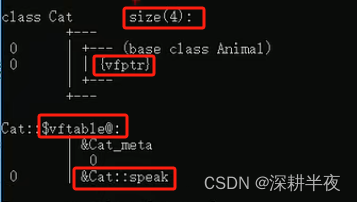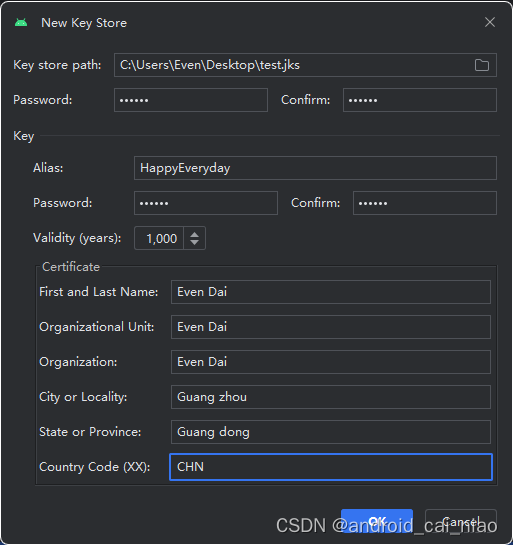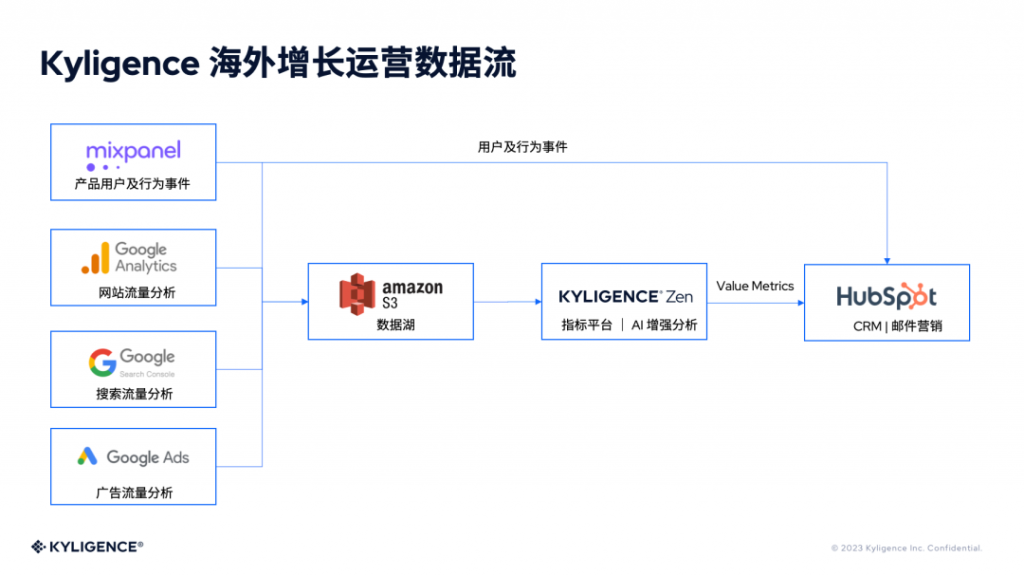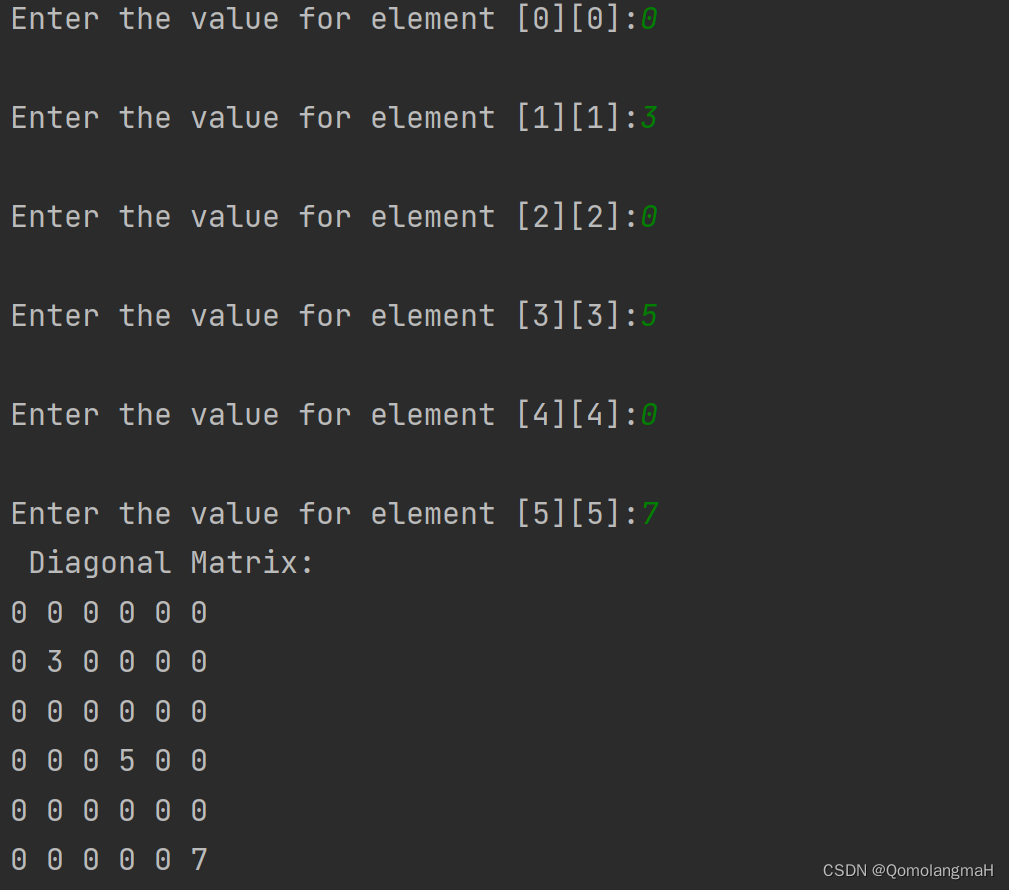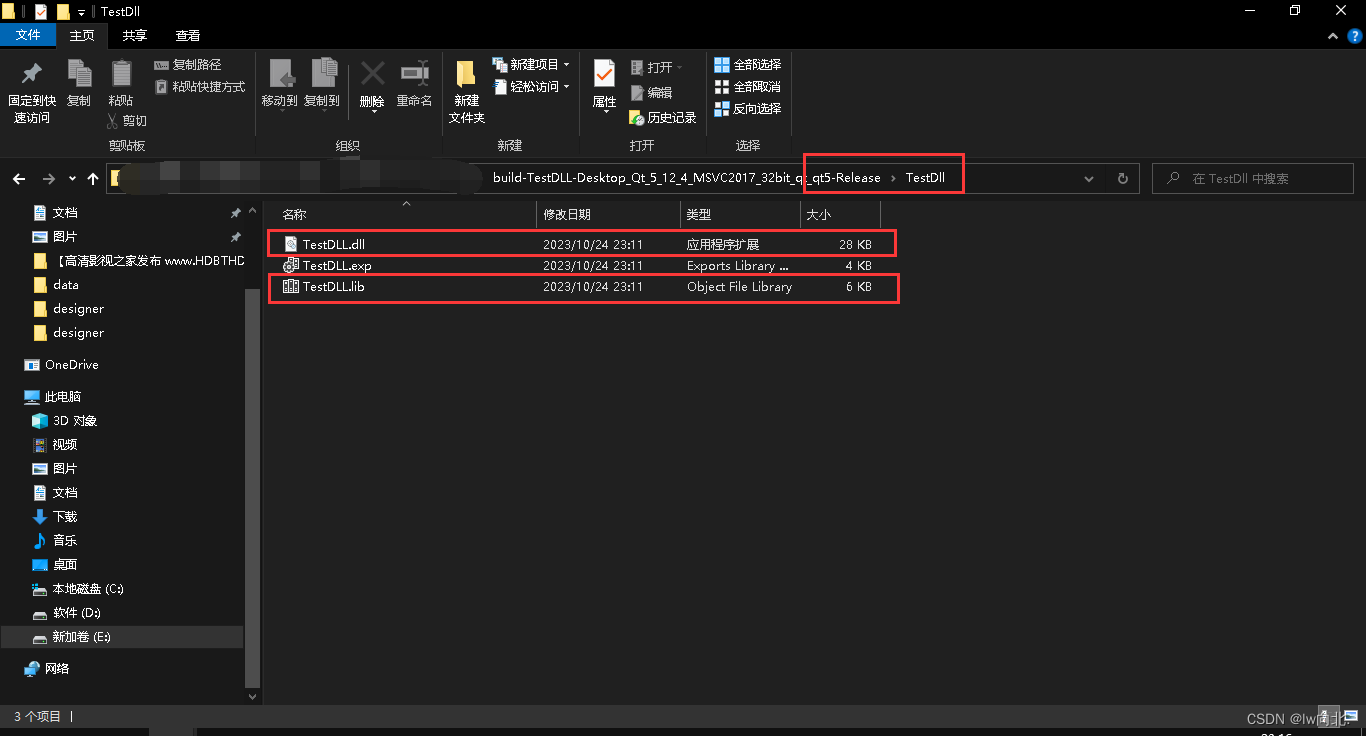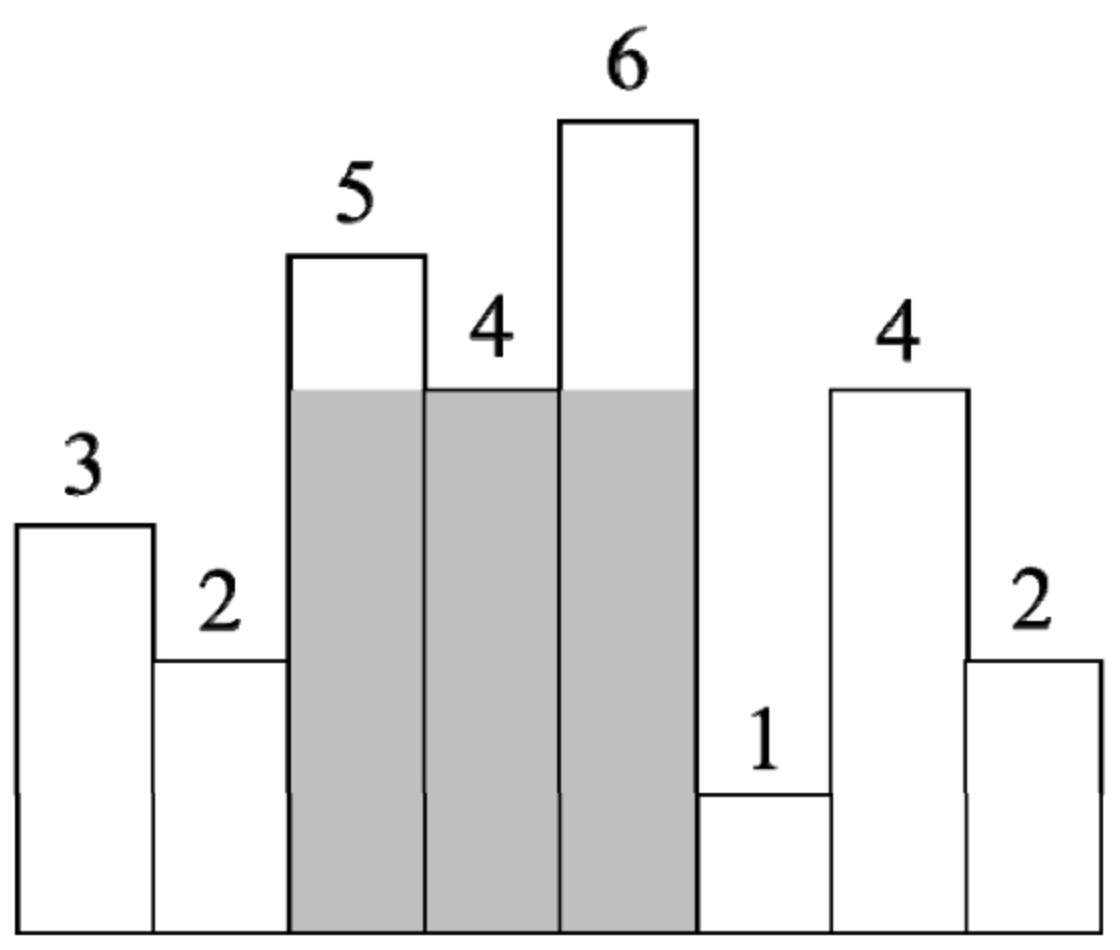2017年亚太杯APMCM数学建模大赛
A题 睡眠对人体的影响
原题再现
自2001年以来,世界睡眠医学协会将每年的3月21日定为世界睡眠日,以引起人们对睡眠的重要性和质量的关注。
一整天的精神状态取决于昨晚的睡眠质量,高睡眠质量自然保证了人们精力充沛。但据统计,中国成年人失眠率高达38.2%,青少年失眠率也在上升。一般来说,如果入睡时间超过30分钟,就属于失眠的范畴,所以我们相信许多参与者也是失眠者。长期失眠会使人感到疲劳,一整天精力不足,注意力无法集中,因此工作和学习效率也较低。严重失眠甚至会引起自主神经功能紊乱,导致身体各系统失衡和各种问题。
影响失眠的因素很多,一般可分为客观因素和主观因素。客观因素是环境变化、睡前喝茶或喝咖啡等,主观因素一般是生活压力、情绪失落、精神兴奋等精神因素。然而,处于生长发育期的年轻人的大脑极易因学习和工作压力而疲劳。因此,他们必须特别注意卧床休息,以确保身体健康。
人体睡眠质量和可能影响睡眠质量的各种指标数据见附件一。(来源和测试编号不是指标)
附件二给出了睡眠状况的相关分数(“0”表示良好,“1”表示正常,“2”表示较差,“3”表示极差),分数越高,睡眠状况越差。
(1) 根据附件一中的数据分析给定的指标与睡眠质量之间的关系,如果一个或多个指标与睡眠品质之间没有相关性,则找出并删除。
(2) 分析诊断结果与睡眠之间的关系。
(3) 假设你是一名医生,根据附件三中的数据,你会对患者做出什么诊断?给出您的诊断结果。
(4) 为了身体的健康,如何科学地安排我们的休息时间?制定适当的睡眠计划并评估其有效性。
整体求解过程概述(摘要)
据统计,中国人的失眠率正在上升。如果人们不注意休息,长期失眠会导致各种疾病的发生。因此,为了保持身心健康,需要一个合理的睡眠计划。
为了解决问题1,首先,本文分析了附件一中的数据,排除了异常数据。然后,根据新数据确定指标与睡眠质量之间的相关性,使用SPSS分析每个属性的Pearson相关系数,从而消除了一个名为Reliability的无关属性。同时,附件一中的诊断结果根据性别和年龄分为六组,这六组数据中排除了与睡眠质量无关的指标。最后,利用统计分类模型得到了睡眠质量与给定指标之间的多元回归关系。
对于问题2,本文首先分析了附件二表格中的数据,排除了异常值。然后,根据国际分类标准,本文试图用定性分析的方法对诊断类型进行降维分类。接下来,对数据进行定量分析,发现男女比例接近1:2。以建立迭代模型为基础,依据机器学习的深度原理,建立诊断评价矩阵。不断向下迭代低维数据,直到迭代精度达到模型的最优解,然后立即停止迭代,以获得最优解。最后,最终迭代判断的正确性达到72.1%,这意味着疾病变量和睡眠指标具有更高的匹配度。
针对问题3,将附件三中的数据引入问题2的模型中,采用MATLAB算法进行深度机器学习。
第二,使用附件二中的干净数据作为样本集,并将附件三集发送到样本集中进行训练,将获得评估指标。在对最终的评价标准进行排序和筛选得到最优解后,根据最优解,找到相应的疾病。最终,有一半的人患有抑郁症。
针对问题4,本文利用MATLAB进行随机仿真。根据Hadoop的结果规划健康的睡眠时间表,随着迭代次数的增加,Hadoop更有效,并发现影响人们睡眠的指标大多恢复到正常值。
模型假设:
为了简化问题并方便我们模拟现实生活中的条件,
我们做了以下基本假设,每一个都是合理的。
假设标题中的数据适合所有人。
假设医生是专业的,但也有判断错误
假设数据源是真实可靠的。
问题重述:
背景
进入21世纪以来,人们的健康意识空前提高,“拥有健康才能拥有一切”的新理念深入人心。因此,睡眠问题引起了国际社会的关注。根据世界卫生组织对14个国家和15个地区的25916名初级保健患者的调查,发现27%的人有睡眠问题。据报道,美国失眠的发病率高达32至50%,英国为10~14%,日本为20%,法国为30%,中国超过30%。50%的学生睡眠不足。
睡眠障碍对生活质量有负面影响,但相当多的患者没有得到正确的诊断和治疗。睡眠障碍已经成为威胁全世界公众的一个突出问题。
影响失眠的许多因素通常可分为两大类,即客观因素和主观因素。客观因素有环境变化、睡前喝茶或喝咖啡等。;而主观因素一般是生活压力、情绪损失、精神兴奋等心理因素。然而,在他们的成长和发展过程中,年轻人很容易因为学习和工作的压力而感到疲惫。因此,他们必须特别注意卧床休息,以确保身体健康。
问题重述
为了研究睡眠对人体的影响,根据附件一和附件二中的数据解决了以下问题:
根据附件一中的数据,分析给定指标与睡眠质量之间的关系。如果一个或多个指标与睡眠质量之间没有相关性,请识别并排除它们。
分析诊断与睡眠之间的关系。
根据附件三中的数据,对患者进行了诊断并给出了结果。
如何安排休息以保持良好的健康?制定睡眠计划并评估其有效性。
文献综述
为了测量睡眠质量,匹兹堡大学精神病学家Buysse博士和其他人于1989年编制了匹兹堡睡眠质量指数(PSQI)。该量表适用于睡眠障碍、精神障碍患者,也适用于一般睡眠质量的评估。
基于匹兹堡睡眠质量量表,严有为和林荣茂通过收集问卷和构建结构方程模型,进一步研究了焦虑与睡眠质量的关系及其潜在机制。结果表明,焦虑敏感学生的PSQI得分明显高于低焦虑敏感学生。焦虑敏感度越高,睡眠质量就越差。
正是因为睡眠问题在所有年龄段都会出现。因此,研究老年人的睡眠也是必要的。对此,赵培秋通过对65例老年患者的临床观察护理,分析了老年人失眠的原因,包括生理因素、心理因素、环境因素、药物因素、饮食因素五个方面。
进一步的研究是基于模型与现实的比较。刘贤臣、唐茂琴提出以神经症患者为测试对象,采用统计学分析技术对匹兹堡睡眠质量指数进行信度和有效性测试。
模型的建立与求解整体论文缩略图
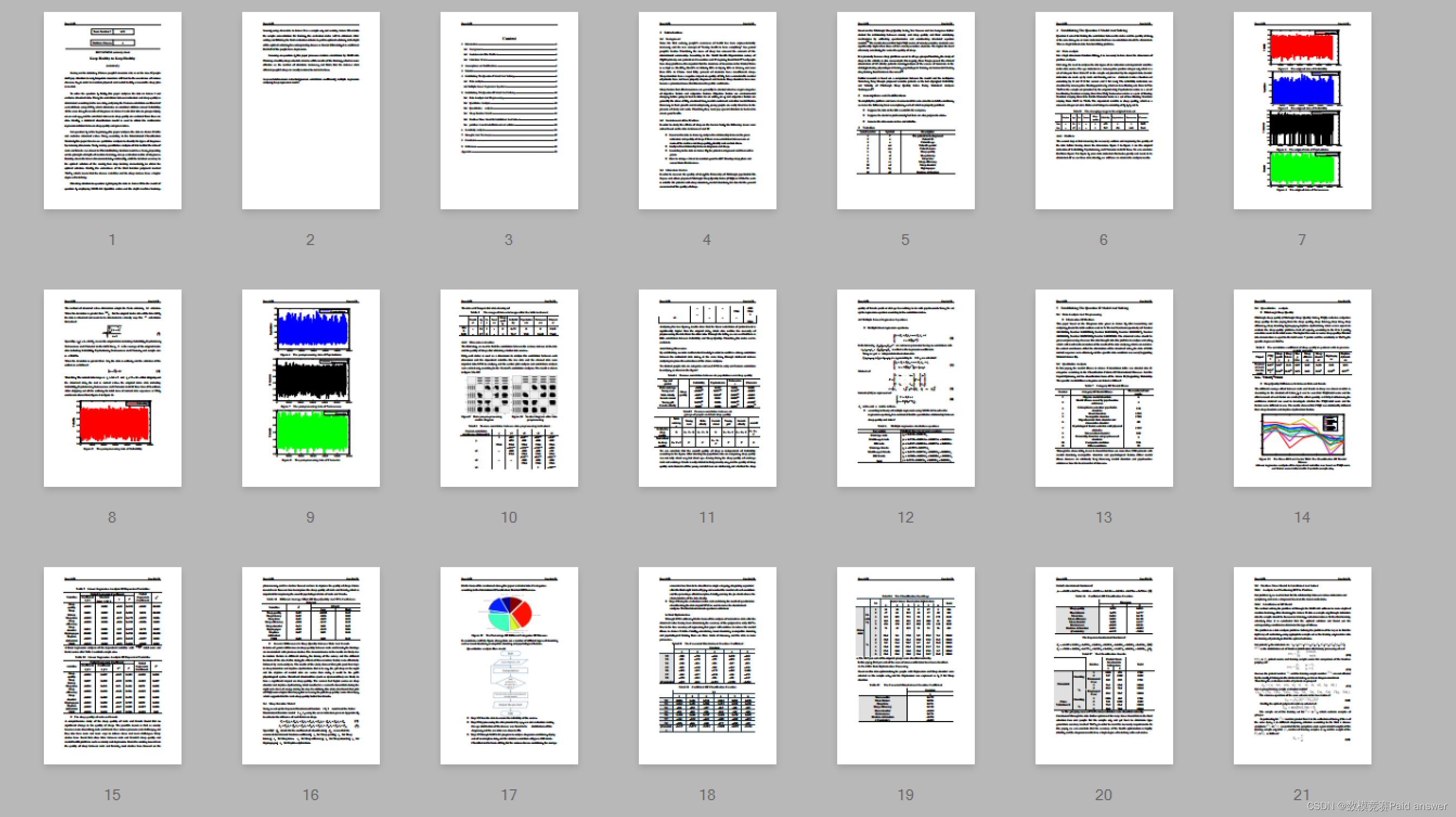
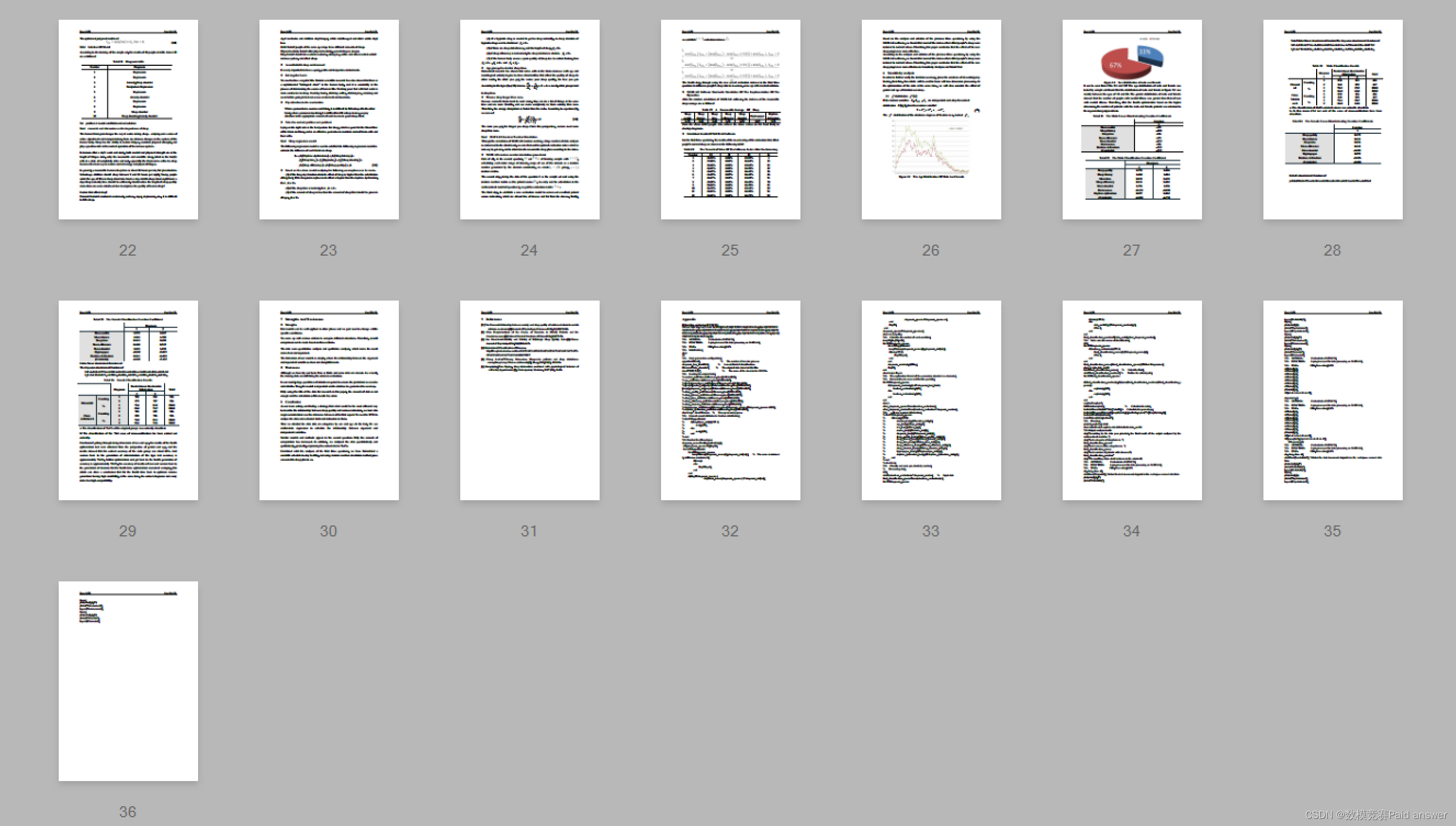
全部论文及程序请见下方“ 只会建模 QQ名片” 点击QQ名片即可
程序代码:
部分程序如下:
// Operating environment: EXCEL;
=EXACT($C$2,C16)*EXACT($D$2,D16)*(SQRT(POWER(($B$2-B16),2))+SQRT(POWE
R(($E$2-F16),2))+SQRT(POWER(($F$2-G16),2))+SQRT(POWER(($G$2-H16),2))+SQRT(
POWER(($H$2-I16),2))+SQRT(POWER(($I$2-J16),2))+SQRT(POWER(($J$2-K16),2))+SQ
RT(POWER(($K$2-L16),2)))
%% AUTHOR: Contestants of APMCM;
%% FUNCTION: A program used for data processing on MATLAB;
%% TIME: 25th,Nov ember,2017.
%% Initialization;
clear
clc
%% Basic parameters configuration;
upperlimit=5665; % The number of rows to process.
diagnosis_less_limit=100; % Lowest limit of classification.
filename='data_clear.xlsx'; % The original data stored in this file.
sheet='原始数据'; % The name of the sheet in the EXCEL.
%% Loading the original data;
% number_init=xlsread(filename,sheet,'A2:A6350');
% age_init=xlsread(filename,sheet,'B2:B6350');
% [temp1,temp2,sex_init]=xlsread(filename,sheet,'C2:C6350');
% [temp3,source_init,temp4]=xlsread(filename,sheet,'D2:D6350');
[temp5,diagnosis_init,temp6]=xlsread(filename,sheet,'E2:E6350');
% sleep_quality_init=xlsread(filename,sheet,'F2:F6350');
% sleep_latency_init=xlsread(filename,sheet,'G2:G6350');
% sleep_time_init=xlsread(filename,sheet,'H2:H6350');
% sleep_efficiency_init=xlsread(filename,sheet,'I2:I6350');
% sleep_disorder_init=xlsread(filename,sheet,'J2:J6350');
% hypnagogue_init=xlsread(filename,sheet,'diagnosis_species 2:diagnosis_species 6350');
% daytime_dyfunction_init=xlsread(filename,sheet,'L2:L6350');
clear temp* sheet filename % Free up memory space.
%% Convert sexual attributes to Boolean distribution;
% for i=1:upperlimit-1
% if(length(sex_init{i}) == 4)
% sex(i,1)=1;
% else
% sex(i,1)=0;
% end
% end
%% Number the illness types
diagnosis_names=cell(upperlimit-1,1);
i=1;diagnosis_species =1;flag=0;
for m=1:upperlimit-1
for i=1:diagnosis_species
temp=strcmp(diagnosis_names{i},diagnosis_init{m}); % The same is returned
1, defference is returned 0;
if(temp)
else
flag=flag+1;
end
end
if(flag==diagnosis_species )
diagnosis_names{diagnosis_species } = diagnosis_init{m};
diagnosis_species =diagnosis_species +1;
end
flag=0;
end
diagnosis_species=diagnosis_species-1;
clear i m temp flag
%% Calculate the number of each condition;
temp=0;flag=0;m=0;
for i=1:diagnosis_species
for m=1:upperlimit-1
temp=strcmp(diagnosis_names{i},diagnosis_init{m});
if(temp == 1)
flag=flag+1;
end
end
diagnosis_number(i,1)=flag;
flag=0;
end
clear temp i flag m
%% The explanation format of the conversion disorder is a character;
%% Find out the rare ones and find the quantity;
for i=1:diagnosis_species
if(diagnosis_number(i,1) <= diagnosis_less_limit)
boolean_evaluation(i,1)=1;
else
boolean_evaluation(i,1)=0;
end
end
clear i
other_diagnosis_species=sum(boolean_evaluation);
other_diagnosis_number=sum(boolean_evaluation.*diagnosis_number);
%% call any required information;
% for i=1:diagnosis_species
% if(temp(i,1)==1)
% number_less(i,1)=number_init(i,1);
% age_less(i,1)=age_init(i,1);
% sex_less(i,1)=sex_(i,1);
% source_less{i}=source_init{i};
% diagnosis_less{i}=diagnosis_init{i};
% sleep_quality_less(i,1)=sleep_quality_init(i,1);
% sleep_latency_less(i,1)=sleep_latency_init(i,1);
% sleep_time_less(i,1)=sleep_time_init(i,1);
% sleep_efficiency_less(i,1)=sleep_efficiency_init(i,1);
% sleep_disorder_less(i,1)=sleep_disorder_init(i,1);
% hypnagogue_less(i,1)=hypnagogue_init(i,1);
% daytime_dyfunction_less(i,1)=daytime_dyfunction_init(i,1);
% end
% end
% clear temp
%% Classify and make pie charts by number;
% Processing data;
k=1;
data=(~boolean_evaluation).*diagnosis_number; % Input data
final_classification_species=sum(~boolean_evaluation)+1;
for i=1:diagnosis_species
if(data(i) == 0)
else
data_useful(k,1)=diagnosis_number(i,1);
k=k+1;
end
end
final_classification_numbers=[data_useful;other_diagnosis_number];
%% Make sure the names of classification;
k=1;
for i=1:diagnosis_species
if(boolean_evaluation(i) == 0)
final_classification_names{k}=diagnosis_names{i};
k=k+1;
end
end
final_classification_names{final_classification_species}='Other Diagnosises';
clear i k data data_useful
label=final_classification_names; % Enter the label;
data=final_classification_numbers'; % Define the salient parts;
for i=1:final_classification_species
if(final_classification_numbers(i,1)>(sum(final_classification_numbers)/final_classification_s
pecies))
explode(i,1)=1;
else
explode(i,1)=0;
end
end
explode=explode';
bili=data/sum(data); % Calculate the ratio;
baifenbi=num2str(bili'*100,'%1.2f');% Calculate the percentage;
baifenbi=[repmat(blanks(2),length(data),1),baifenbi,repmat('%',length(data),1)];
baifenbi=cellstr(baifenbi);
Label=strcat(label,baifenbi');
%% Drawing;
pie(data,explode,Label)
clear i label Label explode data bili baifenbi data_useful
%% Output analysis result.
disp('According to the data you provided, the final result of the output analyzed by the
mathematical modelis:')
disp('Each categorie of disorders is:')
final_classification_species'
disp('Each names of the categories is:')
final_classification_names
disp('Each number of patients with disease is')
final_classification_numbers'
disp('The resulting of pie chart is shown in the window.')
%% AUTHOR: Contestants of APMCM;
%% FUNCTION: A program used for data processing on MATLAB;
%% TIME: 25th,Nov ember,2017.
clc,clear, close all;
data=load('shuju.txt'); %Enter the text document shuju.txt in the workspace named data form
plot(data(:,1),'r')
ylabel('Reliability');
legend('Reliability');
figure;
plot(data(:,2))
ylabel('Psychoticism');
legend('Psychoticism');
figure;
plot(data(:,3),'k')
ylabel('Nervousness');
legend('Nervousness');
figure;
plot(data(:,4),'g')
ylabel('Character');
legend('Character');
%% AUTHOR: Contestants of APMCM;
%% FUNCTION: A program used for data processing on MATLAB;
%% TIME: 25th,Nov ember,2017.
x1=data(:,1);
x2=data(:,2);
x3=data(:,3);
x4=data(:,4);
x5=data(:,5);
x6=data(:,6);
x7=data(:,7);
y=data1(:,1);
x=[x1 x2 x3 x4 x5 x6 x7];
stepwise(x,y)
%% AUTHOR: Contestants of APMCM;
%% FUNCTION: A program used for data processing on MATLAB;
%% TIME: 25th,Nov ember,2017.
x1=data(:,1);
x2=data(:,2);
x3=data(:,3);
x4=data(:,4);
x5=data(:,5);
x6=data(:,6);
x7=data(:,7);
y=data1(:,1);
x=[x1 x2 x3 x4 x5 x6 x7];
X=[ones(1623,1) x1 x2 x3 x4 x5 x6 x7];
b=regress(y,X)
%% AUTHOR: Contestants of APMCM;
%% FUNCTION: A program used for data processing on MATLAB;
%% TIME: 25th,Nov ember,2017.
clc,clear, close all;
data=load('yuchuli.txt'); %Enter the text document shuju.txt in the workspace named data
form
plot(data(:,1),'r')
ylabel('Reliability');
legend('Reliability');
figure;
plot(data(:,2))
ylabel('Psychoticism');
legend('Psychoticism');
figure;
plot(data(:,3),'k')
ylabel('Nervousness');
legend('Nervousness');
figure;
plot(data(:,4),'g')
ylabel('Character');
legend('Character');
